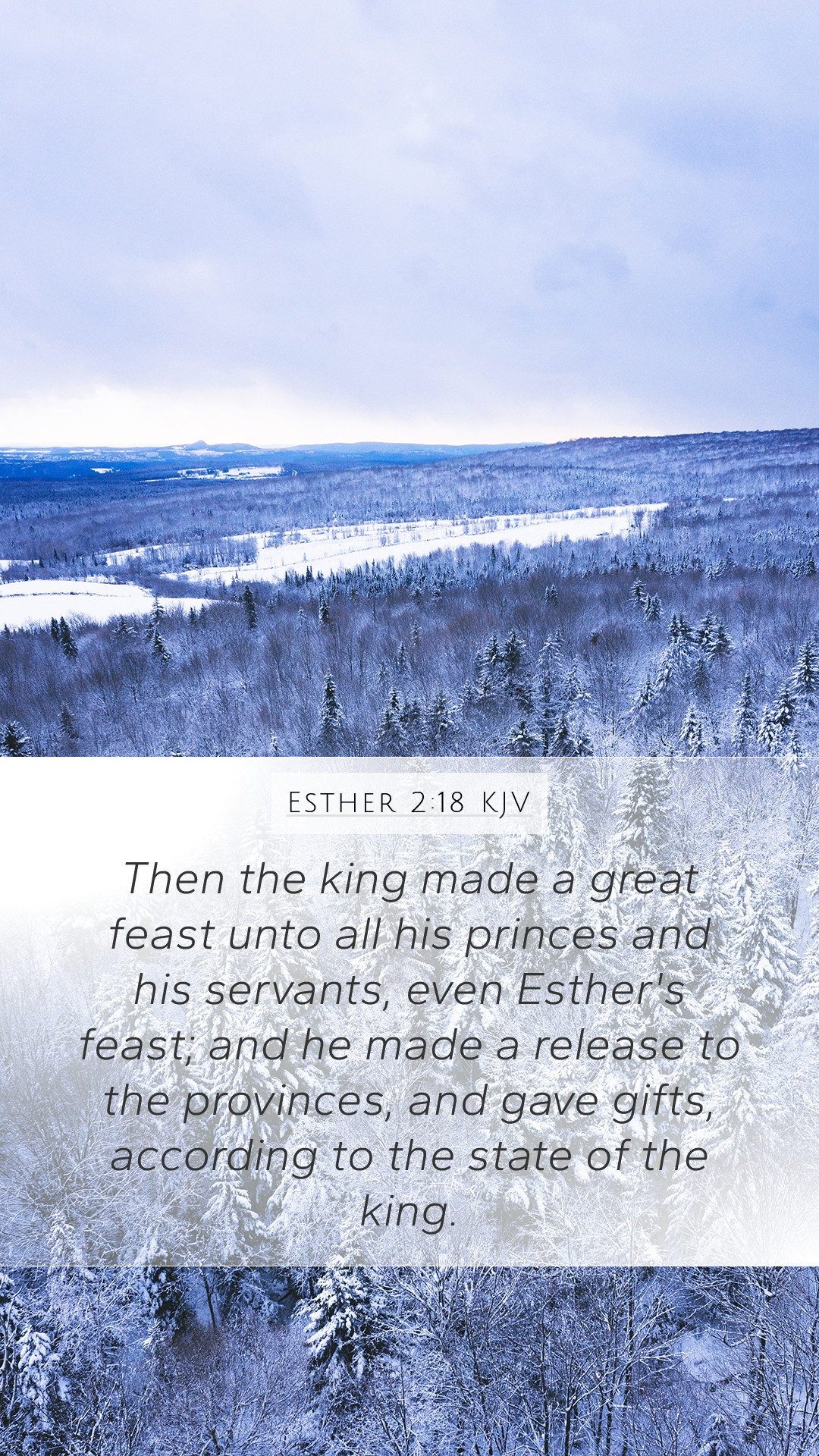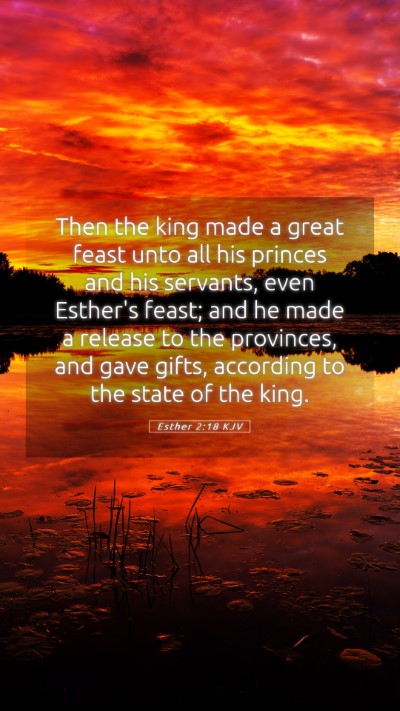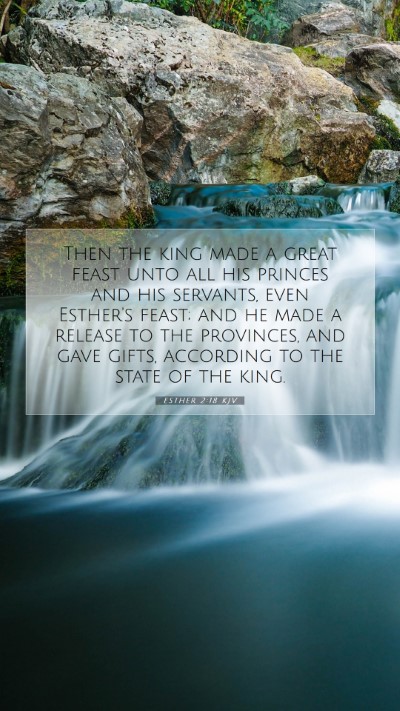Old Testament
Genesis Exodus Leviticus Numbers Deuteronomy Joshua Judges Ruth 1 Samuel 2 Samuel 1 Kings 2 Kings 1 Chronicles 2 Chronicles Ezra Nehemiah Esther Job Psalms Proverbs Ecclesiastes Song of Solomon Isaiah Jeremiah Lamentations Ezekiel Daniel Hosea Joel Amos Obadiah Jonah Micah Nahum Habakkuk Zephaniah Haggai Zechariah MalachiEsther 2:18 Meaning
What is the meaning of Esther 2:18?
Then the king made a great feast unto all his princes and his servants, even Esther's feast; and he made a release to the provinces, and gave gifts, according to the state of the king.
Esther 2:18 Bible Verse Meaning
Bible Verse Commentary: Esther 2:18
Verse: Esther 2:18 - "Then the king made a great feast unto all his princes and his servants, even Esther's feast; and he made a release to the provinces, and gave gifts, according to the state of the king."
Understanding Esther 2:18
Esther 2:18 presents a pivotal moment in the Book of Esther where King Ahasuerus (Xerxes) honors Esther, who has been chosen as queen. This verse is significant as it highlights themes of providence, celebration, and the favor that Esther finds in the eyes of the king.
- Historical Context: The events take place in a time of Jewish exile, under Persian rule. Esther’s ascent to queenship not only underscores her personal story but also sets the stage for the eventual deliverance of her people.
- Feasting as a Cultural Practice: The king's feast is a cultural expression of nobility and importance in ancient Persia, symbolizing wealth and the joy of a good fortune. It highlights the significance of Esther in the royal court.
- The Release to the Provinces: The king's declaration of a release to the provinces indicates a temporary easing of burdens, aligning with themes of favor and goodwill, possibly as a means to garner loyalty from his subjects after Esther's selection.
Bible Verse Explanations and Interpretations
Matthew Henry's Commentary
Matthew Henry indicates that the feast signifies Esther being elevated among the people. It showcases God's provision, where Esther not only becomes queen but also receives favor that leads to celebrations reflecting her new role. Henry emphasizes that such moments remind believers of God's hand in their lives.
Albert Barnes' Notes
Barnes elaborates on the significance of the feast, noting that this was a time of public recognition for Esther. He interprets the gifts and release as forms of appreciation that the king shows not only to Esther but to the people, reflecting a time of prosperity and goodwill attributed to Esther's influence.
Adam Clarke's Commentary
Clarke points out that the "gifts" mentioned in the verse reflect the practice of the kings to win favor among their subjects. He sees Esther's elevation as an opportunity for God’s plan unfold in her life and emphasizes the importance of her role in the historical narrative of Israel's salvation.
Theological Reflections
This passage can be seen as a reflection of God’s sovereignty and providence. Esther’s position is not merely a stroke of luck, but a fulfillment of God’s plan for His people during a perilous time. Kingship and authority in the Bible often symbolize God’s ultimate authority over nations, and Esther's rise signifies divine favor that supports His purposes.
The Role of Celebration in Faith
Celebration in the Bible often accompanies moments of divine intervention or blessing. This feast is more than just a royal event; it represents a collective acknowledgment of God's goodness and providence toward Esther and her people. In modern application, believers are encouraged to celebrate God's blessings in their lives actively.
Practical Applications
Understanding Esther 2:18 allows individuals to reflect on the following teachings:
- Divine Favor: Recognizing that God's favor can lead to unexpected blessings and changes in one's life.
- Community Celebration: Encouraging communal gatherings in recognition of God's favors and blessings as a part of faith practice.
- Embracing One's Role: A reminder to embrace one's place in their community or family as a means to do good and reflect God's love.
Cross References
This verse can be cross-referenced with the following passages:
- Esther 1:3: The importance of feasting in Persian culture.
- Esther 8:17: The transformation of the situation for the Jews, illustrating the impact of Esther's role.
- Proverbs 21:1: A reminder that the heart of the king is in God's hands, aligning with Esther's rise and significance.
Conclusion
In summary, Esther 2:18 serves as a rich theological passage that emphasizes God’s providence, the significance of Esther’s role, and the joy of communal celebration. Through the insights of Matthew Henry, Albert Barnes, and Adam Clarke, readers can grasp not only the historical context of this verse but also its application in understanding our own lives and the blessings of community.


